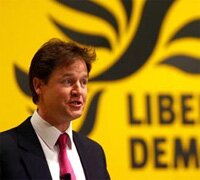Budget hits poor even more than thought
Drawing on a wealth of data sources, Landman Economics and the Fabian Society, have been building a statistical model for the TUC and Unison over the last few months which shows how public spending affects different households and income groups.
Don’t Forget the Spending Cuts! is the first study based on the model and it reveals just how strikingly regressive the Budget is once you factor in the spending cuts which neither the Treasury nor the IFS’s analysis included.
The model reveals that:
the average annual cut in public spending on the poorest tenth of households is £1,344, equivalent to 20.5% of their household income, whereas the average annual cut in public spending on the richest tenth of households is £1,135, equivalent to just 1.6% of their household income.
The graph based on the data tells its own remarkable story (you can click on it for a bigger version):

The Observer has a report on the study today.
Also: Next Left – So, what happens to fairness when you look at the spending cuts too?
Update: Left Foot Forward analysis shows that deprived areas will be hit hardest by cuts too.
-------------------------
Share this article
| post to del.icio.us |
This is a guest post. Adam is Head of Economic and Social Affairs at the TUC, blogging at the ToUChstone blog
· Other posts by Adam Lent
Filed under
news
23 responses in total || Add your own
Oooooh, my, yes, this is a lovely little report.
So, we can back calculate from these figures. Cuts of £34 billion lead to a £1,344 fall in public services to the bottom 10% of households. This is about 10% of the cuts (25 million households, 10% of those in the bottom 10%, so 2.5 million times £1,344 is, umm, £3.4 billion or close enough.)
Current spending is what, £700 billion? OK, so, after cuts, let’s call it £650 billion.
The first calculation is done by them (and does not take account of what is to be cut because we don’t know that yet). But we can do the same calculation on the rest of the spending. £650 billion times 10% divided by 2.5 million is: £26,000.
So, the bottom 10% of households get, on average, and from these TUC/Fabian figures, £7,000 a year in income and £26,000 in public services.
Median household income in this country is £30,000 a year or so.
You know, I think we’ve just solved poverty. We just don’t have any poor people any more. Everyone’s consumption basket is higher than median income.
Woo Hoo!
Although quite how to use this fact to insist that public services to the poor should not be cut I’m not sure. That we’ve abolished poverty would seem to be not all that strong an argument in favour of spending yet more on abolishing poverty, would it?
As Tim points out, this report indicates that the 10% of the population with the lowest incomes have an average income of around £7,000. Those on such incomes benefit from the rise in the income tax threshold. This report assumes that the money used to finance this tax cut is found from spending cuts. This is a weak assumption since this is at least as likely to have been funded by the increase in capital gains tax – paid by the rich.
As Tim also rightly points out, the report claims that 10% of the cuts affect this 10% of the population. However, this is almost certainly a direct result of the assumption that “spending in some areas where services are enjoyed ‘collectively’ or where there is no basis for allocating different amounts to different households (such as with spending on national defence) is allocated on a flat-rate basis.” Had it been assumed that spending was on the basis of a proportion of each household’s income, for example, the results could well be very different.
In addition, as the IFS has explained, it is misleading to use income as a measure of a household’s standard of living; a much better measure to use is expenditure, since it is expenditure that determines one’s standard of living.
The study assumes that health spending and international development spending will be protected…. and that spending cuts will be equally distributed across the other government departments.
But they won’t be distributed equally.
No doubt the report also assumes that the cuts will be more or less equally applied across the range of departmental activities. But they won’t be.
The government is pledged to seek to minimize the effect on the most vulnerable.
This report is based on two false premises. Total twaddle.
By your logic, flowerpower, nobody is therefore allowed or entitled to try to work out what the effects of budget cuts might be and therefore nobody should be in a position to plan for them.
That is plainly foolish. This report is essentially mapping an unknown landscape, so it is by definition wrong, but it makes a start in trying to work out a scenario.
Dismissing it out of hand instead of looking at it and trying to work out where it tells us something useful is unhelpful.
Of course it hurts the poor. That is the purpose of the Conservative party to hurt the poor. Why the idiot Lib Dems what to join them is very strange.
It is quite right, in my opinion, for people to model the effect on different households. This model makes three wrong but significant errors in my view – see my post above – each error inevitably making the results appear less progressive / more regressive. Therefore the results are unhelpful; were a similar model used but with these three errors corrected, it could be a valuable piece of work; even with two corrected, it might be useful.
To emphasise with one example, the model has assumed that spending is allocated on a flat-rate basis, i.e. that cuts in spending will hit the poorest hardest. It is unsurprising, therefore, that the model concludes that the poorest are hit hardest – it’s something of a circular reference.
By having the Lib Dems on board, the Budget is clearly much more progressive than it might otherwise have been. Of course they’ve not got everything they wanted, but they didn’t win the election. Better to get some of their stuff in there than none at all.
Tim – thanks for your back calculation. It should also be pointed out that this model assumes that any departmental cuts will be translated to value loss at the point of delivery and neglects any “paperclip savings” on the way down (or negotiating cheaper software contracts, spending less on consultancy or sacking unnecessary managers).
Does your £700b spending figure include the health service and benefits by the way? It should be pointed out that these are excluded from the Horton & Reed calculation.
Have written a criticism of this study on LDV:
http://www.libdemvoice.org/opinion-hitting-who-the-hardest-20096.html
Reactions: Twitter, blogs
-
Carl Baker
RT @libcon: Budget hits poor even more than thought earlier http://bit.ly/aHWKpv
-
thabet
RT @libcon: Budget hits poor even more than thought earlier http://bit.ly/aHWKpv
-
Jenni Jackson
RT @libcon: Budget hits poor even more than thought earlier http://bit.ly/aHWKpv
-
Jack Stone
RT @libcon: Budget hits poor even more than thought earlier http://bit.ly/aHWKpv
-
John Turner
RT @jenni_jackson: RT @libcon: Budget hits poor even more than thought earlier http://bit.ly/aHWKpv
-
Derek Bryant
RT @libcon Budget hits poor even more than thought earlier http://bit.ly/aHWKpv
-
Mark Best
RT @libcon: Budget hits poor even more than thought earlier http://bit.ly/aHWKpv
-
John Belford
RT @libcon: Budget hits poor even more than thought earlier http://bit.ly/aHWKpv
-
sunny hundal
New analysis shows Budget hits poor and deprived areas more than thought earlier: http://bit.ly/aHWKpv
-
John Turner
RT @sunny_hundal: New analysis shows Budget hits poor and deprived areas more than thought earlier: http://bit.ly/aHWKpv
-
Dr Scott Davidson
RT @sunny_hundal New analysis shows Budget hits poor and deprived areas more than thought earlier: http://bit.ly/aHWKpv
-
paulstpancras
RT @sunny_hundal: New analysis shows Budget hits poor and deprived areas more than thought earlier: http://bit.ly/aHWKpv
-
Krupesh J. Hirani
RT @sunny_hundal: New analysis shows Budget hits poor and deprived areas more than thought earlier: http://bit.ly/aHWKpv
-
Alison Charlton
@paulstpancras RT @sunny_hundal That budget just gets worse don't it?
 Good piece factoring in cuts: http://bit.ly/aHWKpv
Good piece factoring in cuts: http://bit.ly/aHWKpv -
cheap
Budget hits poor even more than thought | Liberal Conspiracy: Don't Forget the Spending Cuts! is the first study b… http://bit.ly/d8hTmG
-
sunny hundal
@dandelion101 and lefties are meant to keep quiet while govt hurts the poor? http://bit.ly/aHWKpv and this? http://bit.ly/cbRwj8
Post a comment using the form below
You can read articles through the front page, via Twitter or rss feeds.
» Newspapers push back at Tory cuts with the right approach
» The rightwing myth of Labour’s ‘clientele’
» Rejecting the ‘not in my back yard’ approach to feminism
» Does Jeremy Hunt illustrate why class still matters?
» A left-wing narrative and plan of action against Tory cuts
» How can the left reach out to more people?
» Why the left will always be at a loss without vote reform
» The budget illustrates why it’s time to ditch ‘progressive’
» Dozen eggs banned? Yes, they did make it up
» The three different approaches to Tory cuts
» LC Blog Nation: the aftermath
|
2 Comments 9 Comments 17 Comments 28 Comments 9 Comments 46 Comments 23 Comments 22 Comments 3 Comments 56 Comments |
LATEST COMMENTS » cim posted on When is it right to take away a child from their parents? » Bob B posted on Newspapers push back at Tory cuts with the right approach » Watchman posted on Newspapers push back at Tory cuts with the right approach » cjcjc posted on Newspapers push back at Tory cuts with the right approach » Jerry posted on Newspapers push back at Tory cuts with the right approach » Bob B posted on Newspapers push back at Tory cuts with the right approach » Luis Enrique posted on Newspapers push back at Tory cuts with the right approach » cjcjc posted on Newspapers push back at Tory cuts with the right approach » The Vicar posted on Guido's silly rumours on Brown's mental health » Watchman posted on When is it right to take away a child from their parents? » Watchman posted on When is it right to take away a child from their parents? » tim f posted on Rejecting the 'not in my back yard' approach to feminism » quiet riot girl posted on Rejecting the 'not in my back yard' approach to feminism » Paul Sagar posted on When is it right to take away a child from their parents? » quiet riot girl posted on Rejecting the 'not in my back yard' approach to feminism |















